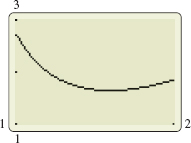EXAMPLE 3Estimating the Error in Using the Trapezoidal Rule
![]()
Estimate the error that results from using the Trapezoidal Rule with n=4 and with n=6 to approximate ∫21exxdx. See Example 2.
A CAS can be used to find f′′(x).
Solution To estimate the error resulting from approximating ∫21exxdx using the Trapezoidal Rule, we need to find the absolute maximum value of |f′′| on the interval [1,2]. We begin by finding f′′: f(x)=exxf′(x)=ddxexx=xex−exx2=exx−exx2f′′(x)=ddx(exx−exx2)=ddxexx−ddxexx2=(exx−exx2)−exx2−2exxx4=exx−exx2−exx2+2exx3=ex(1x−2x2+2x3)
Since |f′′| is continuous on the interval [1,2], the Extreme Value Theorem guarantees that |f′′| has an absolute maximum on [1,2]. We find the absolute maximum of |f′′| using graphing technology. As seen from Figure 17, the absolute maximum is at the left endpoint 1. The absolute maximum value of f′′ is |e1(11−212+213)|=e. So, M=e.

When n=4, the error in using the Trapezoidal Rule is Error≤(b−a)3M12n2=(2−1)3(e)(12)(42)=e192≈0.014
That is, 3.069−0.014≤∫21exxdx≤3.069+0.0143.055≤∫21exxdx≤3.083
513
When n=6, the error in using the Trapezoidal Rule is Error≤(b−a)3M12n2=(2−1)3(e)(12)(62)=e432≈0.006
That is, 3.063−0.006≤∫21exxdx≤3.063+0.0063.057≤∫21exxdx≤3.069